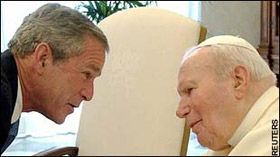 |
 |
 |
 Editorials | At Issue | April 2005 Editorials | At Issue | April 2005  
The Anti-War Pope
 John Nichols - Nation John Nichols - Nation


| During Bush's 15-minute audience last year, the Pope condemned the abuse of Iraqi prisoners as "deplorable" and emphasised that the situation in Iraq had to be "normalised as quickly as possible."

|
Expect to see a lot of George W. Bush over the next day or so, as he attends the funeral of Pope John Paul II. The White House is going out of its way to hype the fact that Bush is the first U.S. president ever to attend the funeral of a pope. And don't be so naive as to think that White House political czar Karl Rove and his minions - all of whom are deeply concerned about the president's declining poll numbers - have failed to calculate the political advantage that might be gained by associating the president with a pontiff whose passing has drawn unprecedented attention in the U.S. and around the world.

As Bush and other global leaders pay their final respects to John Paul II on Friday, however, it is important to remember that the Catholic pontiff was not a fan of this American president's warmaking.

John Paul II was an early, consistent, passionate and always outspoken critic of the president's scheming to invade Iraq. The Pope went so far as to meet with world leaders who were close to Bush, including British Prime Minister Tony Blair and Italian Prime Minister Silvio Berlusconi, in a high-profile attempt to prevent the war. Finally, the Pope sent a special envoy to Washington - Cardinal Pio Laghi, who has long been close to the Bush family - to try and derail the administration's rush to war.

When the war began, aides said that the Pope was "very disappointed and very sad" that Bush had ignored appeals to give peace a chance.

The Pope remained a critic of U.S. actions in Iraq, especially after it was revealed in May, 2004, Iraqi prisoners had been abused by US soldiers at the Abu Ghraib prison.

"From all continents come endless, disturbing information about the human rights situation, revealing that men, women and children are being tortured and their dignity being made a mockery of.... It is all of humanity which has been wounded and ridiculed," John Paul II said.

Those who are honoring the Pope's memory this week frequently refer to him as a man of peace. They would do well to recall that this is more than just a phrase. While the Pope was not a pacifist, he was an ardent foe of unjust and unwise wars. And his opposition to the war in Iraq - and to all forms of preemptive war - is at the very heart of the legacy he has left with regard to international relations. | 
 | |
 |



